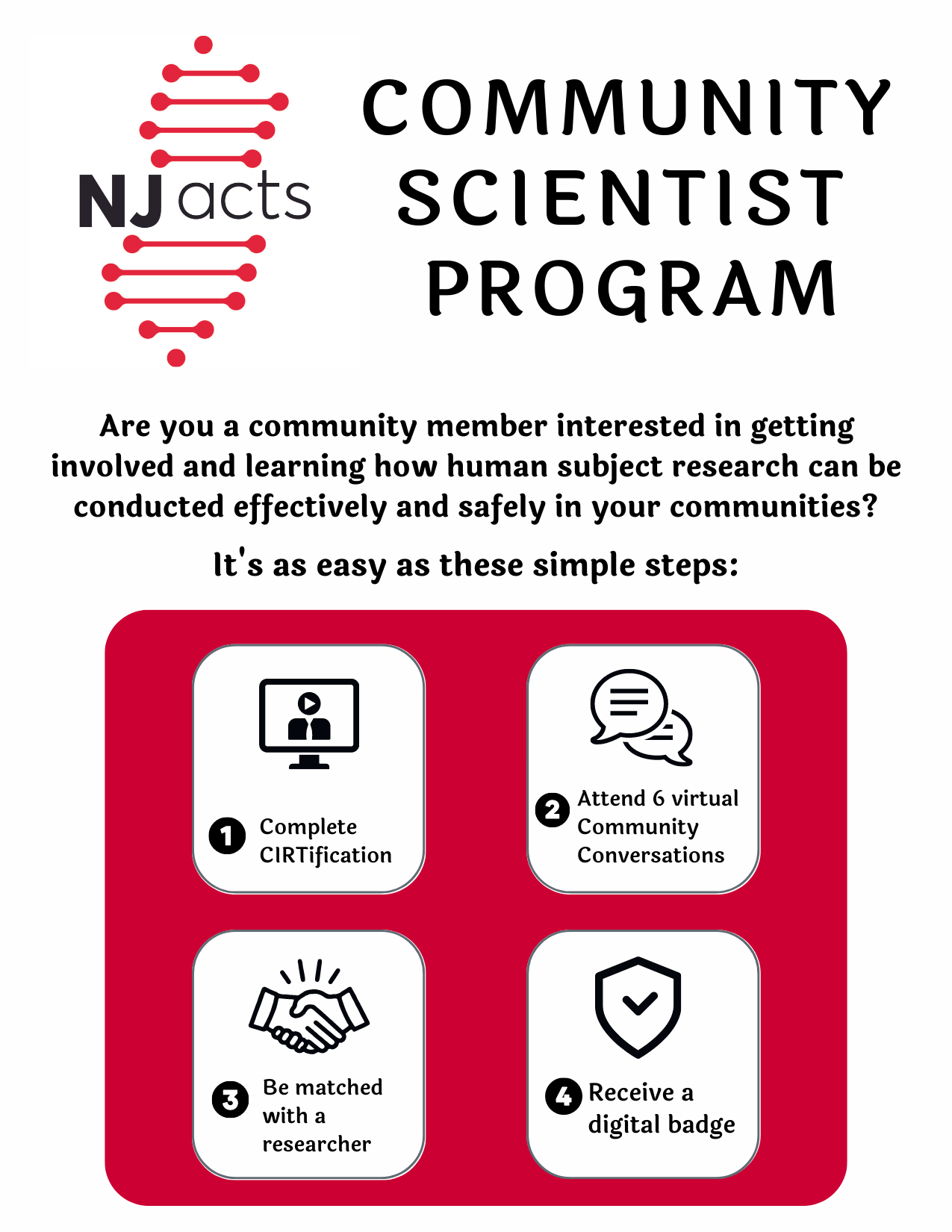180+ networks across 21 NJ counties
COMMUNITY ENGAGEMENT CORE OVERVIEW
NJACTS draws leading academic, industry and community groups together to understand and address the health needs of New Jersey. Central to this is engagement with our community to ensure that our efforts respond to their priorities. Our goal is to conduct research with the New Jersey community, in the community and for the community, and yet, have impact beyond our state’s boundaries.
Stay in Touch!
Join RCommunity!
Join Rutgers Health Service Corps!
Empowering Community-Based Research
Through Cultural and Linguistic Collaboration
- Navigating interpreter-mediated encounters
- Effective translation for research
- Understanding cultural nuances in literacy, trust, and belonging
Through collaboration across disciplines and leveraging expertise within and beyond Rutgers, CrEER ensures that research is inclusive, culturally relevant, and impactful both locally and globally.
👉 Discover how CrEER is shaping the future of community-based research here.
Association for Clinical and Translational Science (ATCS) Membership for Community Members
Did you know that community members are eligible to become members of ACTS through their affiliation with NJ ACTS?
Community members are able to access ACTS’ member benefits, including:
- Discounted registration to the annual Translational Science meeting
- Opportunities to participate in Special Interest Groups and Committees
- Access to the community platform website and more!
Resource for Investigators – CTSA Compendium of D&I Catalogs
Dissemination and implementation (D&I) research focuses on translating evidence-based interventions into real-world settings to improve health outcomes in the broader community.
An open-source CTSA Compendium of D&I Catalogs has been developed by the Clinical & Translational Science Awards (CTSA) Program’s “Advancing Dissemination and Implementation Sciences in CTSAs” working group to support investigators at any stage of their D&I skill-building journey. It provides a curated list of resource catalogs relevant to the conduct of D&I science. The materials include frameworks/theories/models, methods/measures, funding resources, practice resources, training, and health equity resources. Click here to learn more.
CIRTification – A New Alternative to CITI for Community Partners
The rollout of CIRTification at Rutgers has begun. The CIRTification program provides research ethics training alternatives for individuals in community organizations, with limited understanding of conducting human research and protecting potential research participants. This option provides training focused on equipping community partners to conduct human subject research effectively and safely in their communities.
To learn more about the program at Rutgers, please visit this link CIRTification.
NJ ACTS COMMUNITY SCIENTIST PROGRAM
This program is designed to provide researchers with rapid feedback from expert community members to ensure their research projects are culturally appropriate and relevant to the community.
PARTICIPATE IN OUR NEXT COHORT!
For more information, please contact njactscommunity@rwjms.rutgers.edu
NJ HEROES TOO
Through the ongoing New Jersey Healthcare Essential Worker Outreach and Education Study – Testing Overlooked Occupations (NJ HEROES TOO), we have gained a wealth of data on COVID-19’s effects, gleaned valuable learnings on attitudes toward testing and vaccines, and improved COVID-19 awareness in underserved communities.

Community Blog
Unregulated and Unsafe: Expert Warns of Risks in Substance Use Reduction Apps.
In a commentary published by the Journal of the American Medical Association, researchers at Rutgers Health, Harvard University and the University of Pittsburgh discuss the impact of unregulated mobile health and generative artificial intelligence (AI) applications...
NJACTS Community Engagement Core COVID-19 Resources
The situation around the current spread of COVID-19 is changing rapidly. We have compiled resource links for the general community highlighting local resources across New Jersey, ways to get involved, and mental and physical wellness. Visit our COVID-19 page for...
As RSV Season Ramps Up, Here’s What Parents and At-Risk Adults Should Know.
A Rutgers Health pediatric nurse practitioner and educator discusses prevention, symptom management and when to seek medical care. As respiratory virus season begins, pediatric experts are preparing for an expected rise in cases of Respiratory Syncytial Virus (RSV),...
As few as 2 cigarettes per day linked to 50% increased risk of heart disease: Study
Just 100 cigarettes over the course of someone's life may be enough to raise their risk of heart disease and death, a new study suggests. Researchers at Johns Hopkins University, who looked at the smoking habits of more than 300,000 adults for almost 20 years, found...
What You Need to Know About ‘Ozempic Face,’ According to Doctors.
From Ozempic butt to stomach issues, Ozempic side effects are a mainstay in headlines. The “Ozempic face” phenomenon continues to emerge as a result of people taking the medication. According to research, it’s a term used to describe the exaggerated volume loss and...

NJIT and NJII Launch PureTrace Labs to Commercialize PFAS Detection Technology.
New Jersey Institute of Technology (NJIT) and the New Jersey Innovation Institute (NJII) today announced the launch of PureTrace Labs, a startup created to bring NJIT-developed technology for rapid detection of per- and polyfluoroalkyl substances (PFAS) to market. The...


